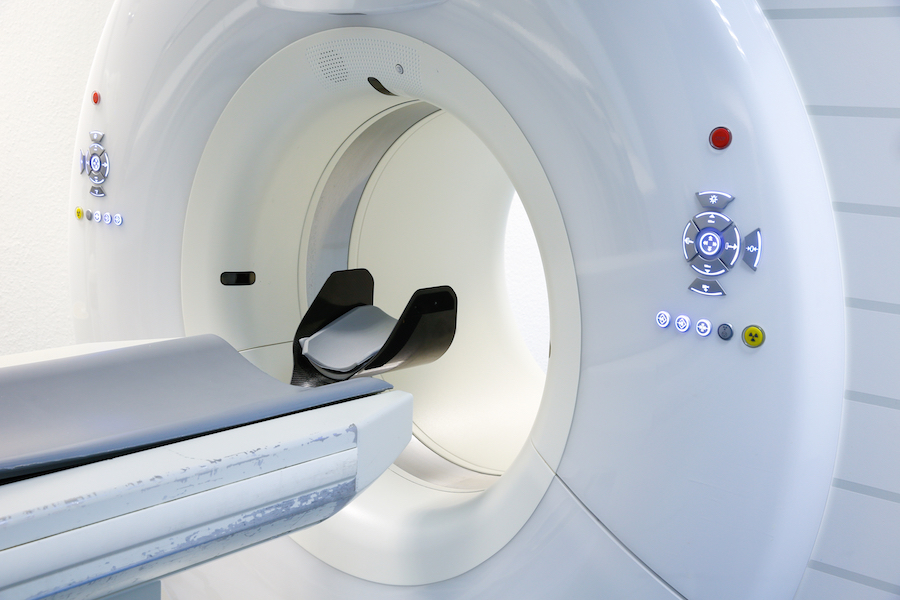MRI or Magnetic Resonance Imaging is one of the most recent medical imaging techniques. Very precise, it allows two- and three-dimensional views of the inside of the body. It is therefore particularly useful for detecting internal diseases or disorders that conventional examinations have not been able to identify. MRI can be used to observe various tissues: organs such as the heart or brain but also muscles and tumours, for which it will provide a very detailed analysis. The fields of application are therefore wide and MRI can be performed to explore cerebral, spinal, cardiac, digestive, gynaecological, vascular or joint bone pathologies.
The MRI provides slice images of the body. Unlike the scanner, which uses X-rays, magnetic resonance images are the result of the interaction between a magnetic field created by the machine and the hydrogen atoms contained in the patient's body. The device is indeed equipped with a very powerful magnet and sending waves that will vibrate the hydrogen nuclei contained in the organic tissues. The return of these hydrogen nuclei to their steady state will generate the formation of a signal in a receiving antenna. These are the changes that will be used to create the images on the screen.
MRI is recommended for patients:
• Who have suffered a head injury
• Patients with cancer
• Patients with tumours
• Patients with vascular or congenital disease….
Duration of hospital stay
1 day.
Patients leave the clinic after the MRI.
Average length of stay
2 to 5 days.
It takes a few days before the results are analyzed.
Only one trip is necessary.

Every year, nearly 11 million patients go abroad in search of medical care. At MEDICAIM, we provide our patients with access to the best hospitals and doctors around the world. Contact us to learn more about your treatment options.
Ask for your free quote abroad
Start your medical stay by requesting a quote. Our customer service department will help you find the clinic that best suits your needs and get you a quote.
Do not hesitate to inform the radiologist in advance if you are claustrophobic because you may not be able to withstand the examination; in terms of quantification, how many floors are you ready to go up so that you do not take the elevator? If the response is greater than 10 stages, the probability of being able to do the MRI is low.
If necessary, a medication will be prescribed to relax you.
Depending on the indication (search for infection, inflammation, etc.), an intravenous injection of non-iodinated contrast media may be used for better image quality. But it is not necessary to fast. You will have to undress in part and not carry any metallic objects (coins, jewellery, buttons, piercing…). A word of advice: remember to empty your bladder before the exam.
The examination usually lasts 15 to 30 minutes.
The duration of the examination can be up to one hour for a more complete examination.
After removing his/her clothes, the patient lies on a bed. The device is then placed on the area to be examined, then the bed slides gently into the mini-tunnel. It is inside this mini-tunnel that the magnetic field is produced.
During the examination, the patient must remain perfectly still but has a bell if something goes wrong to prevent the manipulator. The examination is totally painless and non-invasive.
The only disadvantage is the noise of the machine and the feeling of being locked up, which can disturb some patients. Once the images are taken, they will be interpreted by a radiologist.

Allergy to contrast media is rare and is often limited to the development of hives, nausea or vomiting. Gadolinium complexes are normally well tolerated by the body. In the event of a known allergy, doctors often recommend the administration of antiallergic medication before performing the MRI examination.
Risks and contraindications:
MRI is safe but there are two absolute contraindications: the presence of a metallic foreign body in the eye (such as a splinter of metal…) and the wearing of a pacemaker. You must also report, when making an appointment, any implanted metal equipment or prostheses (including heart implants). If they do not necessarily contraindicate the examination, they may hinder its interpretation.
Your radiologist will give you any further explanation.
MEDICAIM is looking for the best specialists for you and we will offer you several renowned doctors.
MEDICAIM organizes your entire stay for you: post-operative nursing care, biological follow-up, therapeutic, nutritional and psychological support.
Any additional questions? Ask your doctor about it: careteam@medicaim.com
http://www.medicaim.com
Some needs and conditions are more complex than others. In case of doubt, please send us additional information to establish a customized quote.
Ask for a quoteCertains besoins et pathologies sont plus complexes que d’autres. En cas de doute, faîtes-nous parvenir des informations complémentaires pour établir un devis sur-mesure.
Demander un devisEntrust us with your medical file and it will be examined by a specialist doctor. The goal?
Allow you to evaluate all your treatment options.